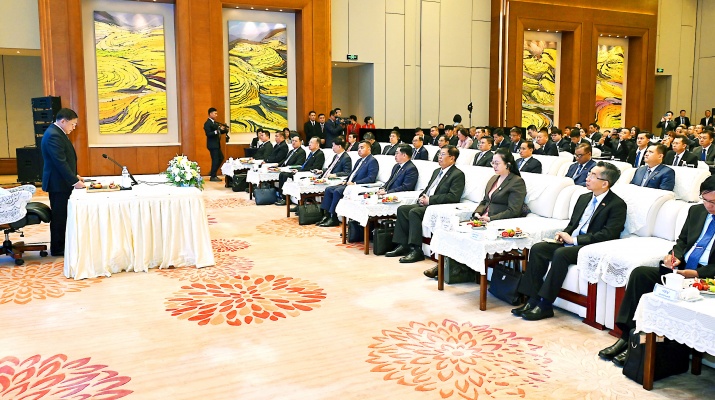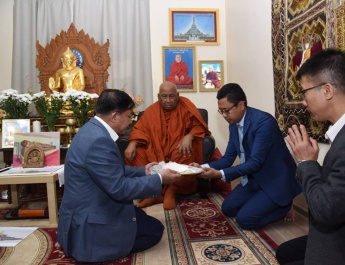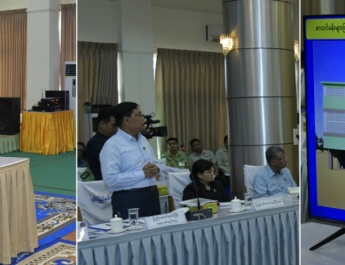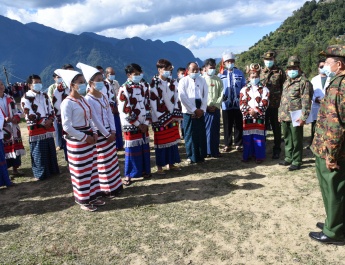NAY PYI TAW November 5
Chairman of the State Administration Council Prime Minister Senior General Min Aung Hlaing delivered a speech at the China-Myanmar Investment and Business Matching at HUALUXE Kunming Hotel in Kunming of the People’s Republic of China this afternoon.
Also present at the meeting were dignitaries of the delegation who accompany the Senior General, the Myanmar Ambassador to China, the president and members of the Union of Myanmar Federation of Chambers of Commerce and Industry, and persons and Chinese entrepreneurs who wish to invest in Myanmar and officials.
Relations of trade and investments between two countries and people are a strategic drive for Myanmar to march towards the future
Speaking on the occasion, the Senior General said he took pride of taking a chance to make a speech. Swe Myo Paukphaw relations between China and Myanmar will reach the diamond jubilee occasion in the future.
At present, it can be seen that while initiating the good relations between China-Myanmar people, businesses and government departments, bilateral trust is enhancing the two countries.
Especially, the relations on trade and investments which are economic cooperation is a strategic drive for Myanmar to march toward the future.
Myanmar is an agro-based country.
Due to its natural location, Myanmar is located in the strategic point where the world’s most populous China and the largest market India and rapid developing ASEAN region meet.
In this regard, Myanmar poses -eases favorable weather and proper land area where agricultural tasks can be successfully done. Myanmar has more than 65 million hectares of farmlands in Southeast Asia. However, Myanmar can grow crops on 20 percent of its arable lands.
So, it is a great opportunity for those wishing to invest in Myanmar to grow crops on the fertile soils without chemical residues.
Likewise, there are many opportunities for investors to engage in agro-based livestock breeding farms on a wider scale.
It can be seen that China is successfully applying the advanced technologies and biotechnological farming systems in the agriculture sector.
Hence, Myanmar’s business partner entrepreneurs will be invited to cooperate with Myanmar in transfer of technique through investment, production of agricultural produce suitable with the regions, and manufacturing value-added products with food safety to sustain ecosystem in a long run.
The Senior General said that he is striving for shaping Myanmar as a country capable of primarily producing foods in the world by utilizing agriculture and livestock sound foundations endowed by the nature.
Myanmar needs agricultural techniques, fertilizer production, natural fertilizer production, plant medicines and pesticides for enhancement of agricultural products.
There are many companies and organizations which contact the Myanmar government to invest in these sectors.
Myanmar is ready to provide necessary aid for them to develop these sectors. So, businesspersons are invited to invest in modern machinery and warehouse activities for agricultural tasks to accelerate the machined farming.
Currently, Myanmar wishes to produce frozen meat by farming chicken, pigs and cows in modern techniques.
Bangladesh and India are populous countries, neigh boring countries in the western part of Myanmar.
These countries have large food markets. So, Myanmar plans to upgrade the agricultural sector as the mechanized farming to produce value-added agriculture and livestock products.
So, foreign investors can invest in agriculture and livestock sectors with separate aid from the government.
In addition to producing value-added products in the agriculture and livestock sectors, Myanmar extends cultivation of cotton and rubber as basic industrial crops.
An aim has been set to produce threads and textile from cotton.
So, Myanmar has a large area for growing cotton. Short- and long-term plans have been drawn for growing rubber so as to increase per-acre yield. An aim has been set to produce slipper, rubber gloves and tyros with the use of raw rubber.
The Senior General gave a message to those businesspersons that Myanmar is encouraging development of production of advanced threads, rubber products and rubber based furniture industries.
Bamboo and rattan are thriving in most parts of Myanmar.
Furniture and utensils will be produced with the use of bamboo and rattan to distribute them to the domestic and international markets.
In order to systematically develop private wood-based industries being operated in accord with the market economic policy of the State, emphasis is being placed on exchange and cooperation in necessary technology and market information.
As Myanmar cannot produce cement at home sufficiently for construction of infrastructures to develop Myanmar, many opportunities can be seen in production of cement. Myanmar has plentiful of raw materials for cement such as lime, gypsum and common quartz.
Moreover, those from solar powered generation enterprises and hydropower industries from China are urged to invest in Myanmar for generating electricity essential for Myanmar daily.
As China is taking a leading role in EV sector in the world, Chinese businesses are invited to invest in Myanmar.
The Myanmar Investment Commission pledges to especially provide aid to services if Myanmar’s business partner entrepreneurs invest in manufacturing of fertilizers, production of EVs for public transport, fertilizers, steel, agriculture and livestock value-added products, medicines and medications, and cooking oil sectors.
In our country, from 1988 to September 2024, foreign investments have reached 93.38 billion U.S. dollars across 12 sectors.
Upon reviewing these investments, the agriculture sector accounts for 0.48 percent, while the livestock and fisheries sector comprises 1.04 percent.
China has invested over 18 million U.S. dollars in the agriculture sector and more than 53.105 million U.S. dollars in the livestock and fisheries sector. We invite investors to increase their investment in Myanmar’s agricultural and livestock industries to seize more opportunities for success.
Trade between our two countries remains strong, with total imports and exports surpassing 8 billion U.S. dollars in the 2023-2024 fiscal year. Additionally, Myanmar has a unique advantage as it shares borders with some of the world’s most populous countries—China, Bangladesh, and India—creating opportunities for advanced food production and other goods.
Myanmar primarily exports agricultural products such as rice, various types of beans, and sesame, along with raw teak, hardwood, and basic wood-based products to China.
Efforts are underway to add value to these exports by producing higher value wood-based products, allowing distribution to both domestic and international markets. Thus, we aim to further enhance trade and investment relations between China and Myanmar.
To support our business partners, we have also provided significant incentives, including tax exemptions and benefits.
In the sectors of transportation and infrastructure, Myanmar is strategically located at the intersection of South Asia, Southeast Asia, and China, making it a key hub for connectivity.
Additionally, Myanmar serves as a potential gateway to the Indian Ocean for China.
We would like to inform investors that Myanmar’s transportation and infrastructure sectors offer promising opportunities.
Regionally, Myanmar was among the first countries to ratify the Regional Comprehensive Economic Partnership (RCEP) agreement.
China has affirmed Myanmar’s participation in the RCEP, which took effect for Myanmar on May 1, 2022. As part of RCEP, Myanmar began issuing RCEP-related certificates of origin and other relevant documentation starting November 1, 2022, providing opportunities for increased economic collaboration.
Besides the RCEP agreement, cooperation between Myanmar and China is also supported by bilateral investment agreements, the ASEAN-China Free Trade Area (ACFTA), and Myanmar’s Investment Law, which offers protections and smooth operations for investors.
To further support our partner, Chinese business operators in Myanmar, we would like to share additional measures taken to facilitate smooth business operations. We have implemented a direct yuan-kyat payment system for trade, cross-border money transfers, and investments, enabling full utilization of the yuan for investments and transactions.
Myanmar’s involvement in China’s Global Development Initiatives (GDI) aligns with many of its eight priority sectors, providing ample opportunities for investors to engage in these areas. With Myanmar’s strategic plans for agricultural development and investment projects, the focus is on enhancing production capacity and competitiveness through innovation. Therefore, we invite interested parties to collaborate in developing research initiatives and disseminating technology to achieve these goals.
Regarding the armed conflicts occurring along the China-Myanmar border, it is noted that armed insurgents have ignored peace offers and invitations for political dialogue extended by the government, instead aiming to disrupt border stability.
Various means were used with intent to gain political and military advantages so that China could misunderstand Myanmar.
The attempt to promote illegal trade in border regions undermines the stability of both governments and endangers regional security.
Such insurgent activities and unlawful trades, including previous drug trafficking and smuggling operations, pose risks that extend beyond borders. These groups, who historically perpetuated militaristic ambitions, are reportedly using issues like democracy and ethnic rights as facades to revive militaristic ideologies.
And “the dead tiger should not be revived.” Given that border trade directly supports the socioeconomic development of both nations’ populations, we call for cooperation to restore border stability and enable trade to resume in these regions for the mutual benefit of our citizens.
Through discussions like these, we have been able to share the prospects for cooperation between our two countries.
This ceremony reinforces our belief that we can work together towards a long-lasting and enhanced partnership for a brighter future.
The persons wishing to invest in Myanmar and Chinese business investors discuss things what they want to know and requirements
Chinese investors interested in Myanmar, as well as those already operating businesses in the country, have discussed their needs and areas of interest.
Additionally, these potential and existing investors shared insights into the current status of their investments in Myanmar, their plans to implement environmentally friendly practices, the challenges they face in their operations, and the status of the Myanmar government to address these challenges to facilitate smoother investments.
They held a friendly and open discussion with the Chairman of the State Administration Council, the Prime Minister about investment conditions in Myanmar, Myanmar’s export and import policies, ways to enhance business communication between the two countries, interest in coal based fertilizer production in Myanmar, and the benefits this project could bring to Myanmar and its citizens.
They also expressed appreciation for addressing the questions from Chinese businessmen.
Relevant Union ministers hold discussions
Union Ministers provided further insights into the questions and discussions raised by Chinese companies. Dr. Kan Zaw, Union Minister for Investment and Foreign Economic Relations, and U Ko Ko Lwin, Union Minister for Energy, emphasized Myanmar’s commitment to renewable energy for electricity generation and consumption, along with long-term plans for sustainable electricity use.
They highlighted the government’s focus on inviting eco-friendly investments, particularly in power generation, as well as easing import and export policies to attract investors.
The ministers discussed measures to stabilize the local economy, such as forming committees to facilitate foreign currency exchange and control inflation spurred by Western financial sanctions. To streamline cross border business, they encouraged direct currency payments (Kyat-Yuan, Kyat-Baht and Kyat-Rupee). Additionally, they outlined ongoing feasibility studies and phased processes for a coal-based fertilizer production project, which aims to bring significant economic benefits to Myanmar.
Response of the Prime Minister to discussions
The Prime Minister provided additional insights on renewable energy during the discussions with Chinese companies and Union Ministers.
He highlighted that Myanmar, like China, has significant potential for renewable energy sources such as hydropower, solar, and wind. Given Myanmar’s hot climate, solar power projects could be particularly effective in certain regions, and water supply through solar generated electricity could enhance their success.
The Prime Minister also emphasized the importance of environmental greening initiatives alongside these projects, especially for hydropower, where conservation efforts are essential.
He affirmed Myanmar’s commitment to creating an environmentally sustainable energy sector and welcomed further investments from Chinese entrepreneurs.
To address inflation, solutions are being developed through a direct payment method to safeguard the interests of traders and investors in Myanmar. Measures will be taken to ensure they face no losses, and any challenges encountered can be reported for swift resolution by the state.
For those interested in investing in agriculture, opportunities are available in Myanmar, following state regulations.
Necessary support will be provided, and investors are encouraged to focus on producing finished goods.
A collective effort is needed to fully restore trade activities in the border regions to their original levels.
Given Myanmar’s strong agricultural foundation, he encouraged the successful implementation of the coal-based fertilizer production project, with improvements progressing as required. For potential investments in steel production, further discussions are welcomed to explore the possibilities.
In conclusion, the Chairman of the State Administration Council, the Prime Minister expressed his satisfaction with the friendly discussion, encouraging investment in Myanmar with confidence for strong business cooperation.
Following the meeting, the Chairman of the State Administration Council, the Prime Minister, and the members warmly greeted the Chinese-Myanmar business representatives and joined them for a luncheon hosted by the Union of Myanmar Federation of Chambers of Commerce and Industry (UMFCCI).





